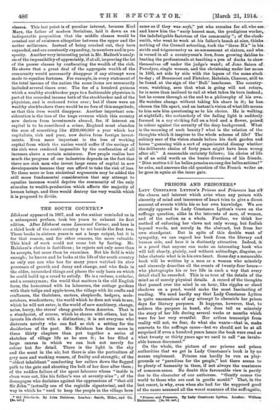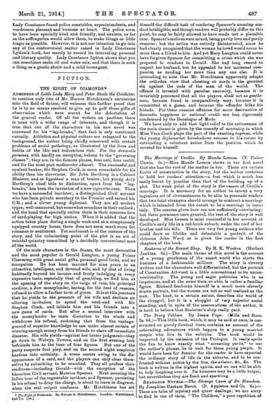PRISONS AND PRISONERS.*
LADY CONSTANCE LYTTON'S Prisons and Prisoners has all, the charm and interest which arise when any person with' sincerity of mind and innocence ofheart tries to give a direct account of events within his or her own knowledge. We are strongly opposed to Lady Constance Lytton's views on the suffrage question, alike in the interests of men, of women, and of the nation as a whole. Further, we think her method of enforcing her views not only wrong, but foolish beyond words, 'not merely in the abstract, but from her own standpoint. But in spite of this double want of sympathy, we can regard her book from the literary and human side, and here it is distinctly attractive. Indeed, it is a proof that anyone can make nn interesting book who will tell clearly, plainly, and without subterfuge, disguise, or false rhetoric what is in his own heart. Some day a memorable, book will be written by a, man or a woman who minutely and sincerely describes all the events of twenty-four hours— who photographs his or her life in such a way that every detail shall be recorded. This is as true of the details of the mind as of merely physical details. A record orthe thoughts that passed over the mind in an hour, like ripples or cloud shadows on a pond, would make the most fascinating of reading. We need hardly say that Lady Constance Lytton is quite unconscious of any attempt to chronicle her prison days for literary purposes. It happens, however, that, to achieve the purpose in band, she does tell us minutely the story of her life during several weeks or months which were for her very eventful. Her artless transcript from reality will not, we fear, do what she wants—that ha, make converts to the suffrage cause—but we sliould.not be at all surprised if even a hundred years hence_the book were read as what twenty or thirty years ago we used to call "an invalu- able human document."
On the whole, the picture of our prisons and prison authorities that we get in Lady Constance's book is by no means unpleasant. Prisons can hardly. be run as play- grounds or "paradises for the people," bnt there seems to be plenty of humanity in them, if not always the 13111/dillitna of common-sense. No doubt this favourable view is partly due to the character of our authoress. "Gently comes the world to those who are cast in gentle mould." That, in the last resort, is why, even when she had for the supposed good of the cause assumed all the worst manners of the suffragette, • Primes, and PriS0011. B7 Lear Conattnee Totten. Louden
Heinemann. ed. net.)
Lady Constance found police constables, superintendents, and wardresses pleasant and humane at heart. The ,police seem to have been specially kind and friendly, and anxious, as far as the-suffragettes would allow them,.to make things as little tragic as possible. However, it is not our intention to go into any of the controversial matter raised in Lady Constance ,Lytton's book, but merely to record its interesting personal and literary quality. Lady Constance Lytton shows that you can sometimes make oil and water mix, and that there is such a thing as a gentleshrew and a mild termagant.











































 Previous page
Previous page